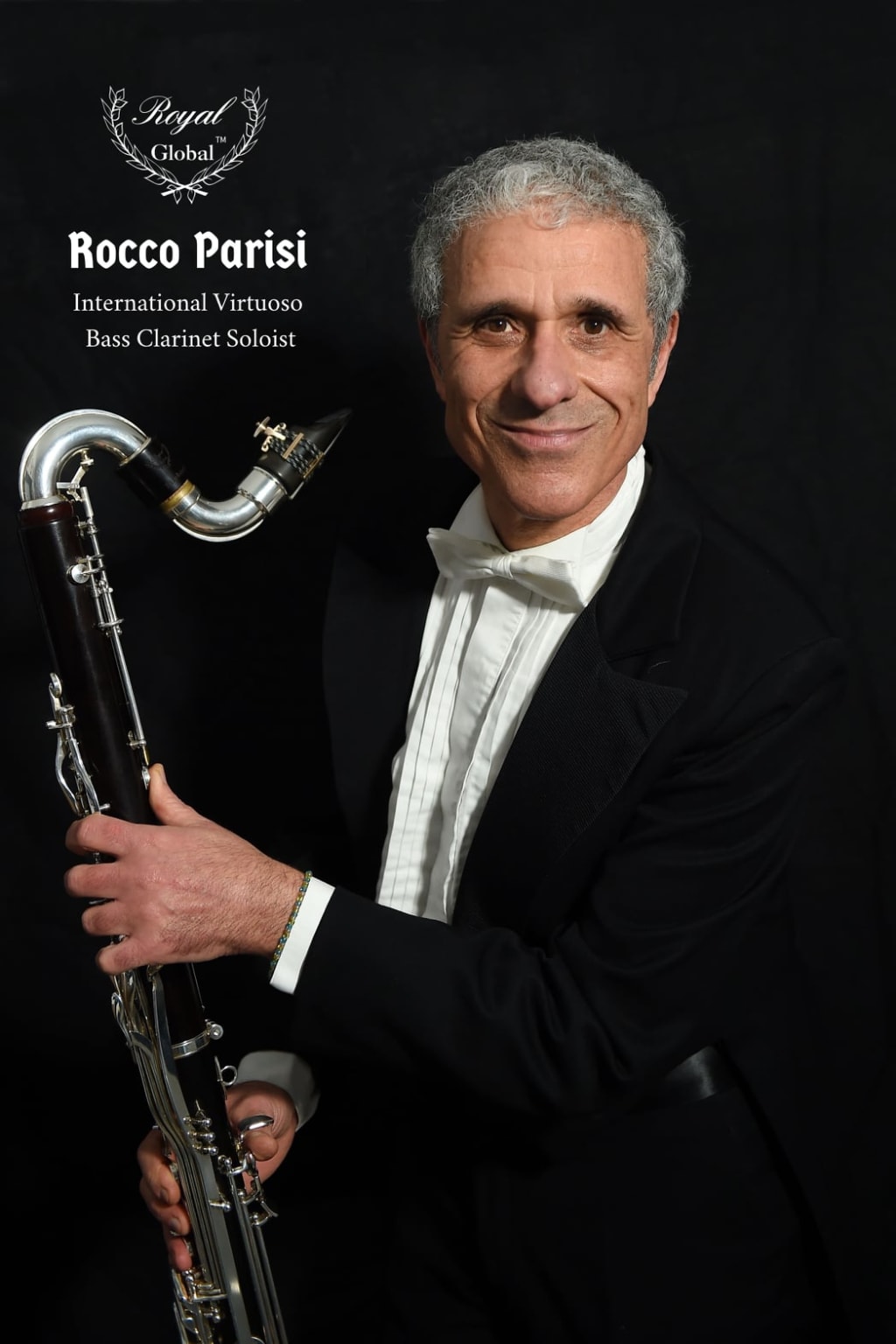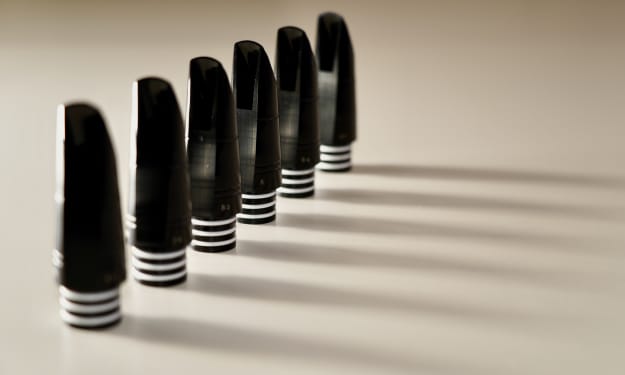Discovering the Bass Clarinet
Rocco Parisi Clarinet U Interview

Rocco Parisi, born in San Pietro a Maida - Italy, studied in Holland, where he gained brilliantly which is the Getuigschrift diploma in bass clarinet, and in Italy gained "cum laude" the clarinet master degree at the Conservatorio "F. Ghedini" of Cuneo.
He has been the winner of various international competitions, including T.I.M. Rome, the Orpheus Prize in Antwerpen, Concorso Internazionale di Stresa…
Parisi took part in Giuseppe Garbarino's masterclasses at the Accademia Chigiana in Siena for four years, each year gaining a special grant, and earning at the end of the four years a Diploma of Honor. Maestro Garbarino subsequently asked Parisi to become his assistant at the Academy. Recognized as a talented interpreter of contemporary music and as an innovator of new techniques for the bass clarinet, many original compositions have been dedicated to Parisi, these being performed by him at important Italian festivals, including Chigiana Novità Siena, Settembre Musica Turin, Biennale of Venice, Nuovi Spazi Musicali Rome and Spazio Musica Cagliari.
He also gave the world premiere of "Sequenza IX c" for bass clarinet and the Italian premiere of "Chemins II c" for bass clarinet and orchestra by Luciano Berio.
A deep collaboration in direct contact with Ennio Morricone, Sylvano Bussotti, and the Italian poet Edoardo Sanguineti allowed him to record some world premiere on CD, playing their compositions in prestigious concert halls.
As a soloist he has performed with several orchestras including " Thailand Philarmonic Orchestra" in Bangkok, giving the premiere of "Rocco e Rollo" concert for bass clarinet and orchestra by Arthur Gottschalk, "Flemish Chamber Philarmonic Orchestra" Bruxelles- Belgium, giving the premiere of "Danzas Mestizas" for bass clarinet and orchestra by Arturo Marquez, Slovak Radio Symphony Orchestra (Slovakia), Kansas Symphony Orchestra (USA), Dinu Lipatti Philharmonic Orchestra Satu Mare (Romania)…
He gave concerts and masterclasses in several foreign countries (Germany, Turkey, Portugal, China, France, Switzerland, Spain, Thailand, USA) and at prestigious venues: Thailand International Composition, Festival Strobel Studio Freiburg, Centrum Sztuki Wspolczenej Warsaw, Music Academy of Kracow, UHR kleinersaal Leipzig, Lisbon Music Conservatory and the Beijing Central Conservatory, "Festival Cervantino" Mexico.
He was invited by the l.C.A. (International Clarinet Association to) give concerts and masterclasses at the world clarinet convention in New Orleans (Louisiana) USA; Stockholm (Swede); Salt Lake City (Utah) USA, Austin (Texas) USA, Assisi (Italy), Baton Rouge (Louisiana) USA, Madrid, Lawrence –Kansas City (USA), Orlando (USA).
The RAI, BRT, and WDR are just a few of the many radio and television stations to have recorded Rocco Parisi. He has performed as bass clarinetist with a number of Italian orchestras, such as Giovanile Italiana of Fiesole, the "Arturo Toscanini" of Parma, the Orchestra da Camera of Padua, Orchestra Sinfonica "G. Verdi" of Milano and RAI O.S.N. (Italian Radio Television National Symphony Orchestra). Parisi has recorded CDs for labels Taukay, Stradivarius, DDT, Nuova Era, AOC Classic - Edizioni Leonardi, Concerto Music-Media, Amadeus, Brilliant classic. He is currently a professor of clarinet and bass clarinet at the conservatory "Antonio Vivaldi" in Alessandria - Italy.
M: When did you approach the world of music?
R: No one in my family was a musician and I grow up in an environment with a great interest in music. When I was a kid, I stopped playing with other kids to listen to music. I felt hypnotized by any kind of music. My first real experience with a musical instrument was when I was fifteen years old. I learn my basic technique by playing the saxophone soprano in a wind band in my city
M: WHEN DID HE APPROACH THE BASS CLARINET?
R: It happened when I finished my regular studies at the Conservatory. I was studying with my teacher Garbarino who at the time was head of the ANSAMBLE GARBARINO group, specialized in contemporary music. We were talking about a bass clarinet during a class and he asked me, "Rocco, do you like it?" I said, "yes!". The master replied, "it's always a problem to find a good bass clarinet player. I'm looking for him, so please study seriously!" and I just listened to him.
M: WHAT EXPERIENCE MADE YOU PARTICULARLY PROUD DURING YOUR CAREER?
R: It is not easy to answer this question briefly. The thing that has made me prouder in my career is the fact that I have been esteemed by great composers such as Luciano Berio, Ennio Morricone, Arturo Marquez, and many others. these composers studied my musical philosophy and I discovered new points of view, different from mine. I will be very happy to talk to you more about this topic next time.
M: Were you inspired by anyone in particular during your studies?
R: I was inspired by my teacher Giuseppe Garbarino. his point of view on music is very close to mine. He understood me when I played repertory pieces in different moods. He has a different approach to music than the others. He is deep and himself in the pieces.
M: Do you have any advice for warm-up?
R: We're usually we usually go in a hurry but I think spending time warming up is very important. Heating is very useful for preparing mouthpieces, reed, and lips. In my opinion, it is better to warm up; prepares me to find harmony with my instrument. How can we do that? warm-up before playing anything. Long sounds are a great exercise to control our sound and we all know that breathing well means good sound. I also suggest playing exercises for tuning. I find it amazing, tune and play. Work on shades with different techniques such as arpeggios and scales.
M: How often do you play the clarinet in b flat?
R: I always play with the soprano clarinet in my piano concerts. But I practice clarinet when I have time for it. Next month, for example, I should play is plan to soda by Igor Stravinsky, and I'm going to use the clarinet in B-flat. If covid restrictions allow us to do so.
M: In which musical genres have you tried during your career?
R: Bene. Gioacchino Rossini Gioacchino Rossini did not distinguish music in genres but between Gioacchino Rossini did not distinguish music in genres but between interesting music and uninteresting music. This is my thought. I love music. I have had and still have many different experiences. From electronic music, I also record a CD with the great Italian poet Edoardo Sanguineti, to jazz, playing with pianist Riccardo Zegna and clarinetist Gabriele Mirabassi. I went from classic to pop. Two things are important to me: know exactly what I'm doing and play without instrumental limits. Luciano Berio said that virtuosity is the conflict between the musical idea and the realization. I grew up with my bass clarinet with these ideals and I'm still going this way.
M: How much covid affect our work?
R: We are in a strange situation and we would all like to get out of it as soon as possible. Activities like music and theatre need an audience, we can't play without it. Streaming concerts are better than not doing any concerts, but they're no better than real ones. We need the warmth of the audience. Playing for the camera is unusual because the camera is not warm. The most important part of a concert is with the audience, their relationship and no relationship in streaming can be established. Online classes are only good for those with a medium-high level of music, but there are several issues to establish sound quality or sound for students with a different level.
M: How do you recommend dividing the studio for those who play both instruments?
R: Clarinet and bass clarinet are very similar but are not the same. I suggest playing both instruments with the same frequency, use a mouthpiece with the same opening and the same pressure with the lips to simplify, switching from one instrument to another. During my masterclasses around the world I meet many guys who play both instruments with different techniques;
M: Do you have any advice on correct breathing? And on circular breathing?
R: We all know that playing is easier if we have good breathing. How is it possible? There are a lot of exercises in many books, but not all of them are useful. I believe there's some confusion about that. I have been lucky because my teacher Giuseppe Garbarino studies for a long time and explains everything to me. Keep in mind that time and practice are fundamental to a child. The secret briefing is an important, but not a strictly necessary technique for a performer. I studied it a long time ago when I had to play a contemporary piece, with very long sounds. The composer suggested me to use a circular briefing but I decided to use regular briefings to great surprise on my part and also on the part of the public.
Interviewed by Maria Maiolo
Published by Clarinet U
Maria Maiolo was born in Soriano Calabro in Calabria, Italy, and graduated from the ITC Institute "G.GALILEI" in Vibo Valentia on 2018. She studied at the "B.Maderna" Conservatory in Cesena to obtain a bachelor's degree in clarinet. She is the protagonist of several concerts around Italy occupying, in the orchestra, the role of second clarinet. Different events, lead her to write the first novel: "THE COURAGE TO CHANGE". Later She is a guest of several libraries, educational institutions and important events. Her novel, is present in several libraries, including that of Vibo Valentia, Cirimido and Orbassano. It has been adopted as an in-depth text in several secondary schools and to date has more than 400 copies sold.
Maria recently published her second novel: "BROKEN LIVES" dedicated to Filippo Ceravolo innocent victim of the Mafia and the struggles of his family.
About the Creator
Clarinet U
We believe Clarinet is the most beautiful instrument.
Clarinet U is an online platforms that focuses on clarinet online marketplace, lessons, and resources for all clarinetists.
www.clarinetu.com






Comments
There are no comments for this story
Be the first to respond and start the conversation.